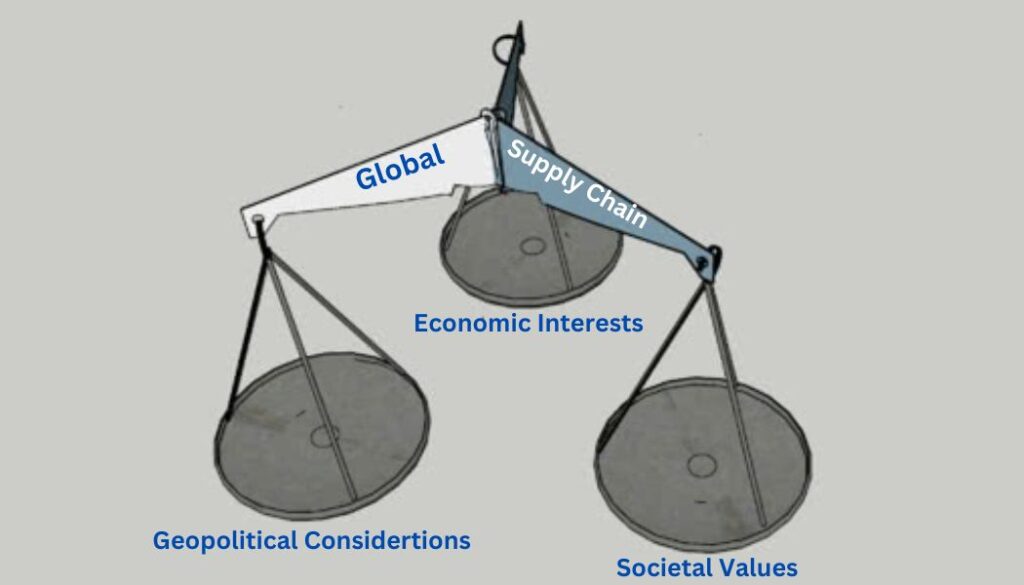The Intersection of Politics and Global Supply Chains
Global supply chains enable the production and distribution of goods across borders, fueling economies and providing consumers with a diverse array of products. It is complex and multifaceted, involving the coordination of numerous stakeholders, countries, and logistics. However, in recent years, politics has become an increasingly important factor in the functioning of global supply chains. In a recent article, I explored the impact of politics on a distribution operation. In this article, I will extend this analysis to explore the intersection of politics and global supply chains, examining how political decisions and events can impact the flow of goods and services around the world.
Impact of Politics on Global Supply Chains
Once a primarily economic affair, supply chains have become a geopolitical battleground shaped by trade wars, sanctions, and the shifting sands of international relations. These are some of the tools governments use to tilt the trade balance in their favor.
Trade Policies and Tariffs: Trade agreements and tariffs are a key area where politics intersects with global supply chains. Governments use trade agreements to establish rules and regulations for international trade, while tariffs are taxes imposed on imported goods. Changes in trade policies can alter the cost structure of supply chains, affecting profitability and competitive advantage. The U.S.-China trade war, a prime example, introduced tariffs on billions of dollars worth of goods, compelling companies to reconfigure their supply chains to avoid higher costs and demonstrating the tangible impact of geopolitical decisions on supply chains.
Geopolitical Tensions: Geopolitical tensions, such as conflicts, territorial disputes, and diplomatic disagreements, can disrupt supply chains by creating uncertainty and restricting the movement of goods. The Russia-Ukraine conflict, for example, has disrupted the supply of critical resources like wheat and oil, causing ripple effects across global supply chains. Similarly, Brexit has created uncertainty for companies that rely on trade between the United Kingdom and the European Union.
Regulatory Changes: Regulatory compliance is a crucial aspect of the intersection of politics and global supply chains. Governments play a significant role in establishing regulations to ensure safety, security, and environmental protection, among other things. Regulation changes, including labor laws, environmental standards, and safety regulations, can impact supply chains by altering production practices and compliance requirements. The implementation of the European Union’s General Data Protection Regulation (GDPR) is a prime example of how regulatory changes can affect supply chain management, necessitating adjustments to ensure compliance.
Sanctions and Embargoes: Economic sanctions and embargoes can restrict trade with specific countries, affecting the availability of raw materials and finished products. Sanctions in Iran, for example, have limited the export of oil and other goods, forcing companies to seek alternative sources.
Political Stability: Political stability in supplier countries is crucial for reliable supply chains. Political instability, such as coups, civil unrest, or government changes, can disrupt production and transportation. The political crisis in Venezuela led to significant disruptions in oil supply and other commodities.
Strategies to Mitigate the effect of Politics and Global Supply
Diversification of Suppliers: Diversifying the supplier base across different countries and regions can reduce dependency on any single source, mitigating the impact of political disruptions. Companies with multiple suppliers can shift production and sourcing to unaffected regions in times of crisis.
Nearshoring and Reshoring: In recent years, governments have increasingly recognized the importance of supply chain resilience as a matter of national security. This has led to a push for reshoring (bringing production back to the home country) or nearshoring (moving production closer to the home country) to reduce reliance on distant and potentially unstable suppliers. These strategies enhance supply chain resilience by shortening supply lines and increasing control over production processes, making companies feel more flexible and responsive.
Scenario Planning and Risk Assessment: Regular scenario planning and risk assessments help companies anticipate potential political disruptions and develop contingency plans. By identifying vulnerabilities and preparing for various scenarios, businesses can respond swiftly to political changes.
Strengthening Relationships with Governments: Building strong relationships with government officials and participating in industry associations is more than just a networking strategy. It’s a powerful tool that can provide businesses with crucial insights into upcoming regulatory changes and political developments. By engaging with policymakers, businesses cannot only stay ahead of the curve but also influence the creation of favorable trade policies, thereby enhancing their competitive edge.
Investment in Technology: Leveraging technology, such as supply chain management software and real-time data analytics, can enhance visibility and agility in supply chains. Advanced technologies enable companies to monitor political developments, assess risks, and make informed decisions quickly.
Compliance and Ethical Practices: Adhering to international standards and ethical practices in labor, environmental sustainability, and corporate governance can reduce the risk of regulatory and reputational issues. Demonstrating commitment to ethical practices can also strengthen relationships with stakeholders and governments.
The Future of Global Supply Chains
The intersection of politics and global supply chains is a complex and evolving landscape. As the world becomes increasingly interconnected, the potential for disruptions will only grow. Companies must develop robust contingency plans, diversify their supply chains, and build strong relationships with suppliers and governments.
Governments, in turn, must work to create stable and predictable trade environments, invest in infrastructure, and support domestic industries. The goal should be to build supply chains that are efficient but also resilient, sustainable, and ethical.
The future of global supply chain will be a delicate balance of three elements as illustrated below.

Laceup Solutions can help you compile the data needed to assess potential risks stemming from external changes. If you want to learn more, give us your information to schedule a meeting.
I hope this article about politics and global supply chain has been helpful to you. I will continue to post information related to warehouse management, distribution practices and trends, and the economy in general. Our channel has a lot of relevant information. Check out this video on Criteria to Select a Vendor.


Sorry, the comment form is closed at this time.